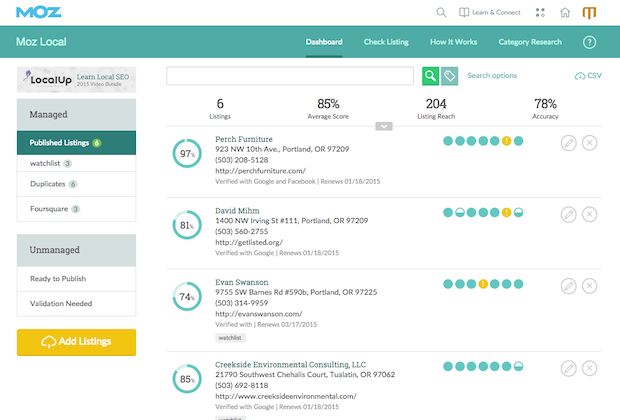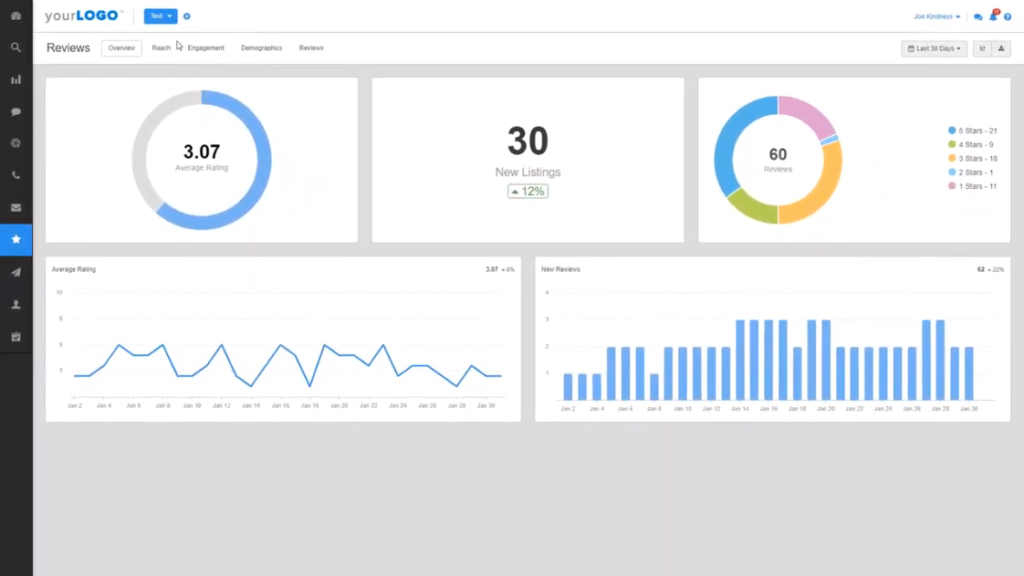If you are looking to have your business show up on local listings, consistency and accuracy are key. Moz Local and Yext are the top two citation building services, and use business’ NAPs (Name of Company, Address, Phone Number) when listing a company. It’s essential to provide consistent information, because the slightest difference in your company’s profiles could affect positioning within local search results.
Our team has put together a direct comparison of both of these services to make it easier for your business to make an informed decision about which platform is best suited for your company.
Moz Local
Moz Local is an online citation building tool that allows brick-and-mortar businesses to extend their reach to online audiences. Using Moz Local’s services allows businesses to manage their online listings better and ensure that the information listed is accurate, consistent, and optimized. Moz shares this information with their partner’s, such as Google, Bing, etc., who then publish this information on their directories.
Additionally, Moz Local lets businesses delete duplicate or inaccurate listings for their company to limit potential inaccuracies.
Pros vs Cons of Moz Local
Moz Local is a remarkable tool for businesses looking to extend their online presence, but for the many positives of using this tool, there are a few disadvantages.
Pros
- User-Friendly Dashboard – Moz Local’s dashboard provides a streamlined overview of all of your business’ listings and allows your company to easily monitor your company’s online performance
- Data Integration – Moz Local continuously re-submits your business’ listings to its partners, which allows you to better-manage your company’s online profiles and ensure that the information listed is consistent
- Location – Moz Local is only available in the United State, Canada, and the UK
- No Duplicate Listings – Moz Local doesn’t just remove duplicate listings temporarily, it permanently deletes duplicate listings to reduce potential damage to your business’ SERP
- Listing Alerts – if any edits are made to your business’ listings or inaccurate information is being published for your business on partners’ sites, you’ll receive an alert right away
Cons
- Manual Responses – Moz Local doesn’t allow businesses to directly respond to reviews that are published on sites other than Google. If a review is posted on a non-Google affiliated site, users must go to the individual listing for their business on that site and respond to the review via that profile
- Three Price Tiers – Moz Local is broken down into three price tiers: basic ($129/year), premium ($199/year), and Complete ($299/year), each offers different features. If a business wants to track multiple campaigns, it’s easy to run out of space/keywords, requiring the company to upgrade their account
- SEO/API – in regards to pricing, only Premium Moz Local businesses are eligible to use SEO Analytic/API features – $249/year opposed to $129/year can be a large investment for small businesses just starting out

Moz Local Dashboard
Moz Local is heralded for it’s user-friendly aesthetic and streamlined access features, but it isn’t the right fit for every business. Below, we’ll offer more information on Moz Local’s direct competitor, Yext.
Yext
Yext, like Moz Local, is a citation building service that lets companies control their online information and manage listings to ensure accuracy. Yext uses a business’ NAP (Name, Address, Phone Number) and other company information, such as business hours, products, etc., and shares this information with Google, Bing, and other data-aggregators to strengthen a business’ online listings.
Pros and Cons of Yext
Yext is available in 50+ countries around the world and has four pricing tiers to accommodate businesses of all sizes.
Pros
- Wide Scope – Yext works in 50+ countries, including Spain, Germany, and Italy
- Ease of Access – Yext has a direct pipe (API) so any edits or changes you make to listings are updated quickly, and the dashboard accommodates 100+ listings, all in one place
- Analytics – Yext provides straight-forward and clear reports on your business’ performance
Cons
- Duplicate Listings – unlike Moz Local, Yext only suppresses duplicate listings, rather than permanently deleting duplicates
- Pricing – $199/year, $449/year, $499/year, and $999/year price-points can be challenging for small businesses to manage
- Aggregators – there are four data aggregators outside of the U.S. – Yext only reports to one of these, Factual

Yext Dashboard
Yext’s dashboard is quick and easily updated, with all of your business’ listings in one place. Yext is excellent for companies that are continually updating listings or adding new profiles.
Comparing Moz Local and Yext
Moz Local and Yext are both user-friendly, streamlined directory listing services, but one core area that both platforms differ, is that Moz Local is targeted towards small-to-medium businesses looking to amplify their online presence in the U.S., Canada, and the U.K., whereas Yext, which features a Powerhouse Listing feature, is an option better-suited towards larger companies, looking to list their business in the U.S., as well as internationally.
Yext’s other features, such as GPS providers, might not be beneficial to every type of business and have limited SEO value, but on the other hand, when comparing Yext to Moz Local, Yext has the upper hand in regards to the timing of listing updates. While Moz Local is quick, Yext is almost-instant due to its API.
Moz Local and Yext both have pluses and minuses, but based on user-friendliness, selection of data aggregators, and flexibility, Moz Local wins out for our team.